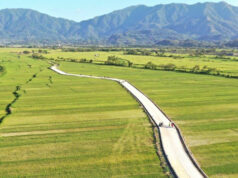LEGISLATORS described as “urgent” the bill creating the Department of Disaster Resilience, citing the ongoing activity at Taal Volcano.
“The occurrence of these unpredictable natural disasters make it more urgent for Congress to pass the measure creating the Department of Disaster Resilience which will be in charge of providing emergency response to natural disasters such (as) earthquakes, typhoons, floods and volcanic eruptions” Speaker Alan Peter S. Cayetano said in a press statement last Sunday.
Deputy Speaker Michael L. Romero called for a special session to tackle the disaster resilience bills and authorize additional funding for disaster response measures.
According to Mr. Romero, the National Disaster Risk Reduction and Management Fund currently has P16 billion, adding that local government units have their own funds for disaster resilience.
“This Taal Volcano eruption is just the first of many disasters this year. P16 billion may not be enough until December. Many of the people affected in the Mindanao earthquakes and by the typhoons that struck Bicol, Eastern Visayas, Mindoro and Western Visayas have yet to rebuild their homes” Mr. Romero said.
The House Committees on Government Reorganization and Disaster Management approved on Nov. 20 the still-unnumbered substitute bill consolidating all measures establishing the Department of Disaster Resilience.
Majority Leader and Leyte Rep. Martin Romualdez also called on the Philippine Institute of Volcanology and Seismology (Phivolcs) to expedite the use of its P221-million budget this year for capital spending on detection and early-warning equipment.
“We do not fault Phivolcs for the lack of adequate warnings on the impact of the phreatic explosion. We are aware that it is really difficult to predict the occurrence of volcanic eruptions and related disasters. But this is precisely the reason why Congress included more than P221.48-million capital outlays in the P588.12-million total budget of Phivolcs for 2020. We need to upgrade the country’s monitoring and warning program for volcanic eruption, earthquake and tsunami” Mr. Romualdez said.
Representatives Alfredo A. Garbin, Jr. of AKO Bicol Party List and Lawrence H. Fortun of Agusan Del Norte said that there should be no-build zones in the permanent danger zones around active volcanoes.
“Permanent and absolute no-build zones must be established fast as adaptation to climate and disaster hazards, as well as to protect ancestral lands, farms, and nature preserves and habitats on land and out at sea,” Mr. Fortun said.
Phivolcs raised Alert Level 4 over Taal Volcano late Sunday, the second-highest alert level on a scale of 0 to 5, signifying activity that can “progress into a highly hazardous eruption.”
Phivolcs recommended the total evacuation of Taal Volcano Island and the surrounding area up to a 14-kilometer radius from the main crater.
Mr. Fortun said the Taal alert is “a stark reminder of the urgent need for a national land and water use law with strong provisions on permanent and absolute no-build zones.”
He such a law, as well as a sustainable forest management law, will allow coastal towns and cities to adapt to higher sea levels that threaten to submerge their land.
“A sustainable forest management law is the natural tandem of a national land and water use law. Both of these our country still does not have despite the fact that the 1987 Constitution foresaw this need. After over 30 years, Congress has failed to approve such laws” Mr. Fortun said.
A national land use act has been pending in Congress for two decades, even after former President Benigno Simeon C. Aquino III certified the bill as urgent in 2013.
President Rodrigo R. Duterte also asked Congress to pass a national land use law during his 2019 State of the Nation Address (SONA). — Genshen L. Espedido



